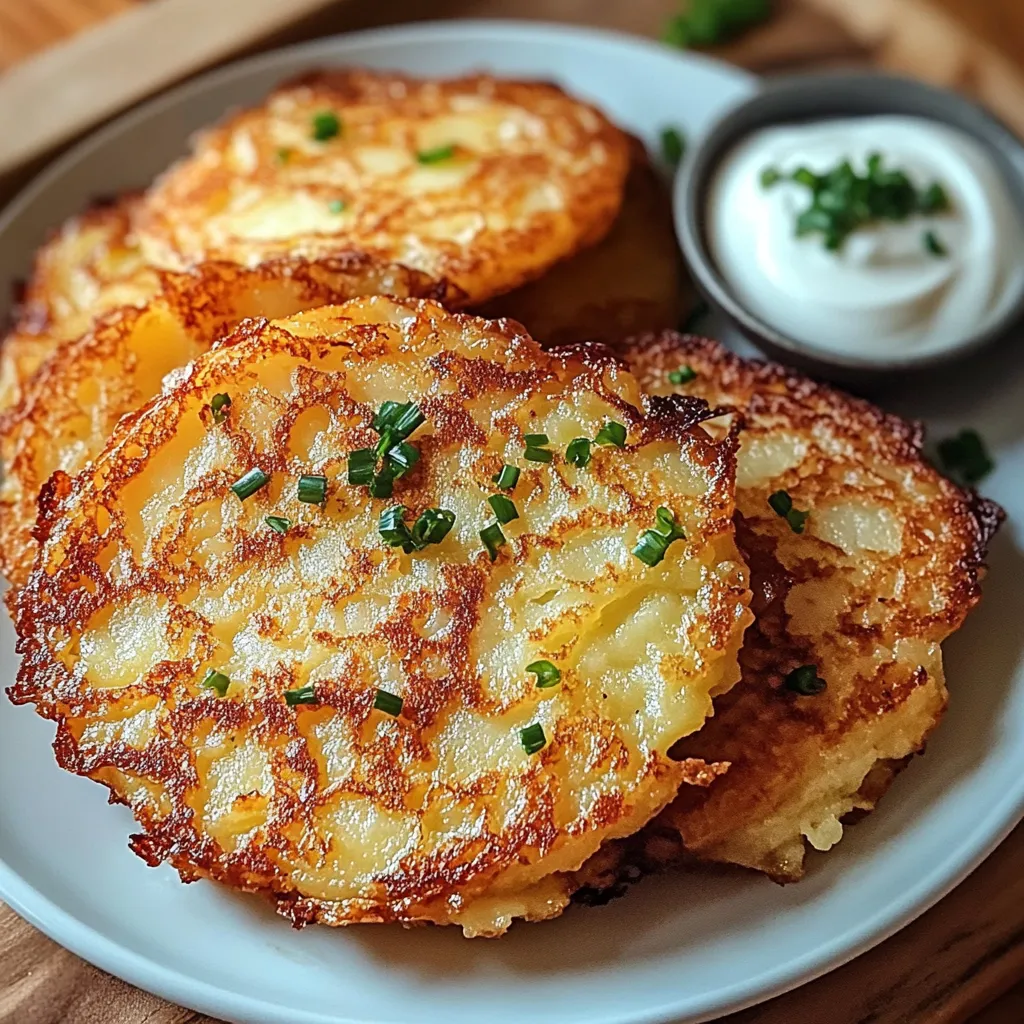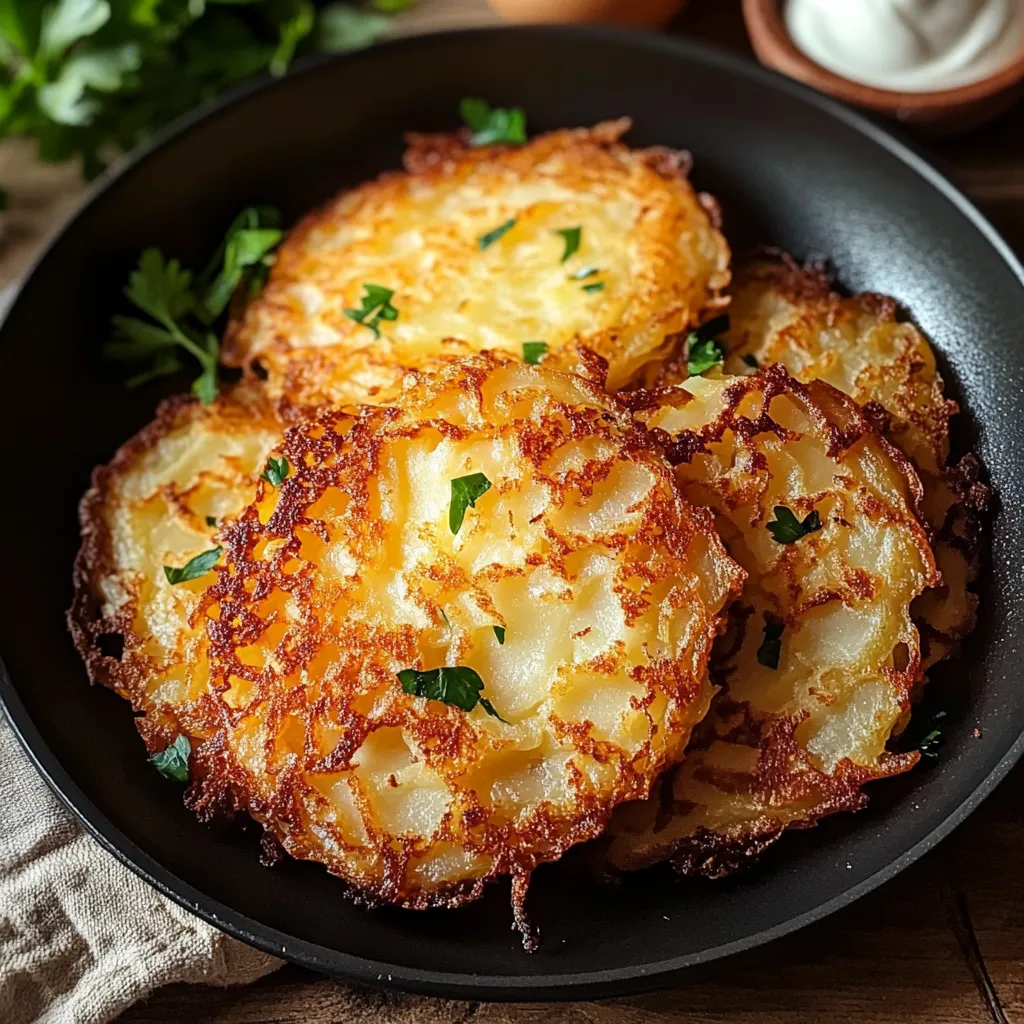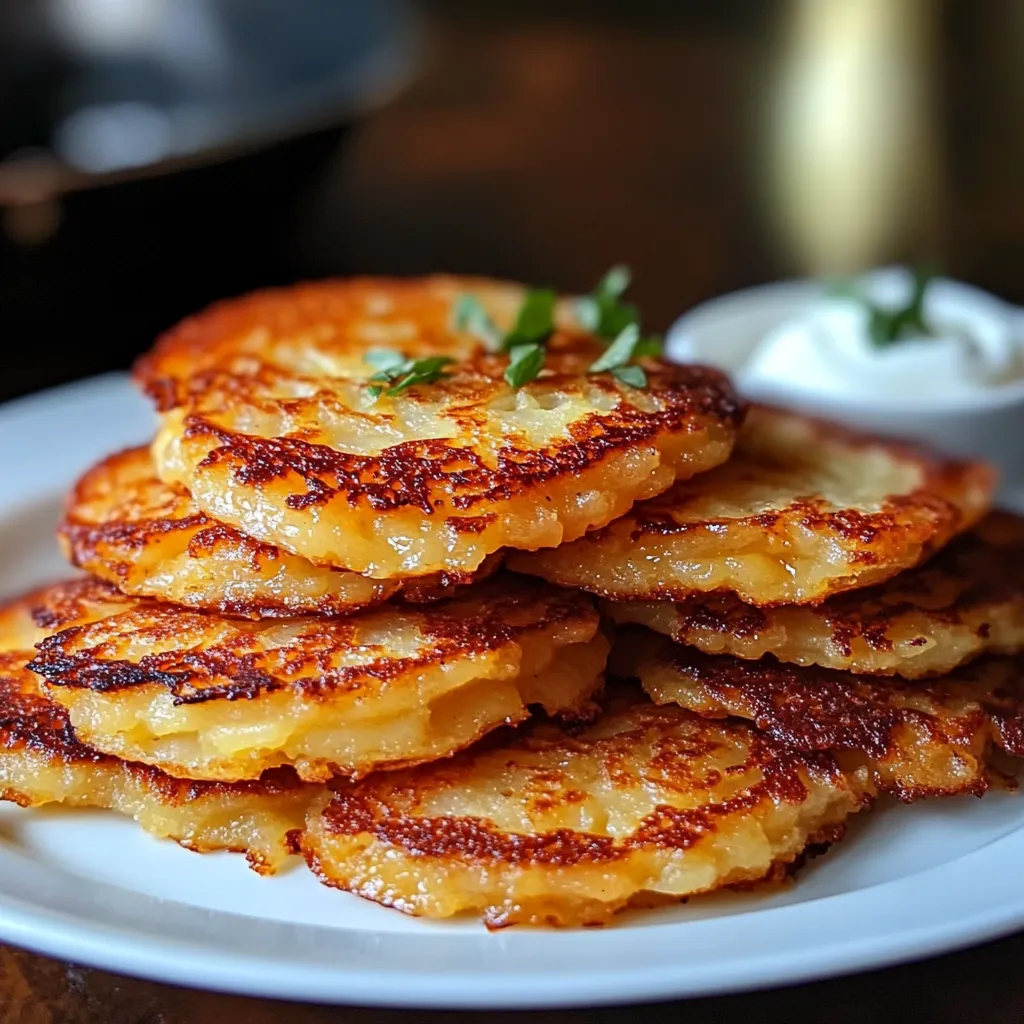 Pin it
Pin it
This traditional German potato pancake recipe transforms humble potatoes into crispy, golden delights that balance a tender interior with perfectly crunchy edges. Passed down through generations, these Kartoffelpuffer (as they're authentically called) deliver comfort food at its finest with minimal ingredients.
I first made these potato pancakes during a winter gathering with friends, and they disappeared faster than any other dish on the table. Now they've become my go-to recipe whenever I need something guaranteed to please everyone from picky eaters to food enthusiasts.
Ingredients
- Russet potatoes: Provide the perfect starchy base ideal for creating that signature crispy texture
- Small onion: Adds subtle sweetness and depth of flavor without overpowering
- Large eggs: Work as the essential binder that holds everything together
- All purpose flour: Helps absorb excess moisture ensuring perfectly crisp results
- Salt: Enhances all the flavors while drawing out excess moisture from potatoes
- Black pepper: Adds a gentle warmth and complexity to the finished pancakes
Step-by-Step Instructions
- Prepare the Potatoes:
- Grate potatoes using the large holes of a box grater or food processor with grating attachment. Immediately place in cold water to prevent browning if not using right away. When ready to use, drain thoroughly and squeeze out excess moisture using a clean kitchen towel. This critical step ensures crispy rather than soggy pancakes.
- Create the Batter:
- Combine the squeezed dry grated potatoes with grated onion in a large mixing bowl. Add eggs, flour, salt and pepper. Mix thoroughly until all ingredients are evenly distributed. The batter should be moist but not watery. Let the mixture rest for 5 minutes to allow the flour to absorb some moisture.
- Heat the Pan:
- Preheat a heavy skillet or cast iron pan over medium heat until hot. Add about 2 tablespoons of neutral oil with a high smoke point such as vegetable or canola oil. The oil should shimmer but not smoke. Test readiness by adding a small bit of batter it should sizzle immediately.
- Form the Pancakes:
- Scoop approximately 1/4 cup of potato mixture for each pancake. Drop into the hot oil and flatten gently with a spatula to about 1/2 inch thickness. Avoid overcrowding the pan work in batches of 2 to 3 pancakes at a time depending on pan size.
- Cook to Perfection:
- Allow pancakes to cook undisturbed for 3 to 4 minutes until the edges turn noticeably golden brown. Carefully flip using a thin spatula and cook the second side for another 3 minutes until deeply golden and crispy. Proper timing ensures the center cooks through while achieving maximum crispiness.
- Serve Fresh:
- Transfer cooked pancakes to a paper towel lined plate to absorb excess oil. Serve immediately while still hot and crispy with traditional accompaniments like applesauce or sour cream.
 Pin it
Pin it
My grandmother taught me to add the tiniest pinch of nutmeg to the batter—it's barely detectable but adds a mysterious warmth that elevates these pancakes beyond the ordinary. Some of my fondest childhood memories involve standing beside her in the kitchen, watching her flip these golden discs with perfect precision.
The Secret to Extra Crispy Pancakes
The difference between good and exceptional potato pancakes lies in moisture control. After grating, place potatoes in a clean kitchen towel and twist tightly to remove every possible drop of liquid. This extra step might seem tedious but makes all the difference in achieving that coveted crispy exterior. Save the potato starch that settles at the bottom of the liquid and add it back to your batter for extra binding power and authentic texture.
 Pin it
Pin it
Perfect Pairings
While traditional German serving suggestions include applesauce or sour cream, these versatile pancakes pair beautifully with numerous accompaniments. Try serving with smoked salmon and a dollop of crème fraîche for an elegant brunch option. For a heartier meal, top with braised beef or mushroom ragout. They also make an excellent base for poached eggs with hollandaise for a German twist on eggs Benedict.
Historical Significance
These humble potato pancakes have deep roots in German culture, particularly associated with winter festivals and Christmas markets. Traditionally cooked on large griddles at outdoor events, the intoxicating aroma would draw crowds eager for a hot, crispy treat during cold weather. In some regions, they're served with plum compote instead of applesauce, showcasing regional variations that have evolved over centuries.
Storage and Reheating
While best enjoyed fresh, leftovers can be refrigerated for up to three days in an airtight container. To reheat, avoid the microwave which will make them soggy. Instead, place on a baking sheet in a 375°F oven for 5 to 7 minutes until hot and crispy again. For make ahead convenience, you can freeze cooked pancakes in single layers separated by parchment paper, then reheat directly from frozen in a hot oven.
Frequently Asked Questions
- → How do I prevent the potato pancakes from sticking?
Make sure to preheat your skillet and use enough cooking oil to prevent sticking. A non-stick or cast-iron skillet works best.
- → What can I serve with potato pancakes?
Traditional pairings include applesauce or sour cream. You can also serve them with smoked salmon, fresh herbs, or a crisp salad.
- → Can I make these pancakes ahead of time?
Yes, you can make them ahead and reheat in a preheated oven at 350°F (175°C) to restore their crispiness.
- → How do I ensure the pancakes are crispy?
Drain excess liquid from the potato mixture before frying, and don’t overcrowd the skillet to allow even browning.
- → Can I freeze the cooked pancakes?
Yes, once cooled, freeze them in a single layer on a baking sheet. After freezing, transfer to a sealed container. Reheat in the oven for best results.
- → Can I use sweet potatoes instead?
Yes, sweet potatoes can be used, but note that they may produce a slightly softer texture and a naturally sweeter flavor.
